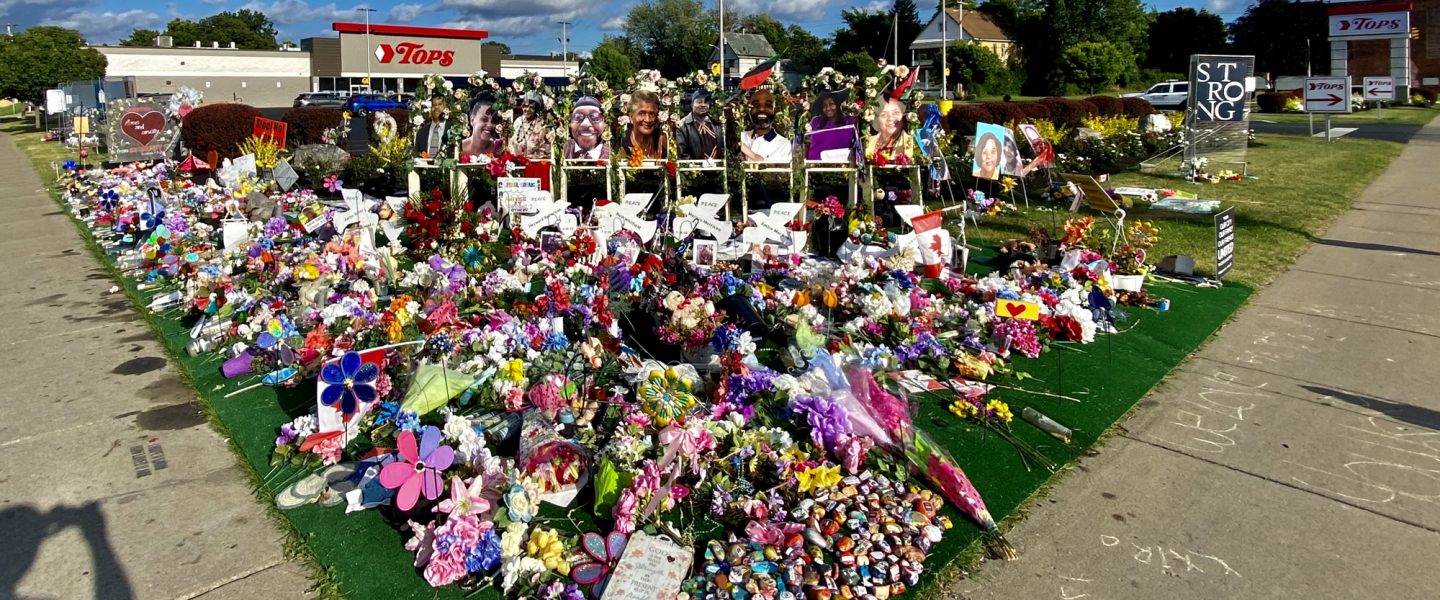Can the ‘Dominion Effect’ Get Social Media Giants to Change Their Ways?
Can social media companies be held accountable for their role in radicalizing killers? The families of the victims from last year’s Buffalo massacre hope so.
|
Listen To This Story
|
It took a lawsuit and a $775 million settlement to hold Fox News to account for helping to spread lies about the 2020 election. Now, the families of three people killed in the Buffalo, NY, mass shooting a year ago are hoping they can do the same with social media companies.
A wrongful death lawsuit filed Friday on behalf of these families as well as one of the survivors alleges that Payton Gendron, the man who committed the massacre and has since pled guilty to murder, was radicalized by the algorithms social media companies have developed to keep people on their websites and apps.
The shooting took place a year ago in a supermarket in a predominantly Black neighborhood in Buffalo. All 10 people who were murdered were Black.
“This horrible crime was neither an accident nor coincidence, but rather the foreseeable result of social media companies’ intentional decision to maximize user engagement over public safety,” said Matthew Bergman, an attorney who co-founded the Social Media Victims Law Center. “Gendron was motivated to commit his heinous crime by racist, antisemitic, and white supremacist propaganda fed to him by social media companies.”
Bergman added that the posts Gendron was exposed to “led him down a rabbit hole of increasingly radical sites, where he was indoctrinated in white supremacist replacement theory and violent accelerationism.”
The lawsuit, filed with the State of New York Supreme Court, claims that the social media companies not only fed Gendron increasingly racist, antisemitic, and violence-inducing content but also provided him with the means to plan and carry out the massacre.
In addition, the killer also broadcast his attack on the livestreaming platform Twitch. The lawsuit alleges that the ability to do so was a major reason why Gendron decided to go through with his plan.
The lawsuit names some of the world’s largest social media sites, including Meta (formerly Facebook), Google’s parent company Alphabet, Discord, Reddit, and Amazon, which operates Twitch.
These defendants “expose and target children, teenagers, and young adults with excessively violent content on their platforms,” the lawsuit alleges.
The operators of sites like Instagram, YouTube, and Snapchat develop algorithms to “maximize engagement of users like Gendron, not by showing them content they request or want to see, but rather, by showing them and otherwise recommending content from which they cannot look away,” the lawsuit further states.
“Payton Gendron has pled guilty to these murders and is no longer a danger to society,” said attorney John Elmore, who represents the families. “However, the social media platforms that radicalized him, and the companies that armed him, must still be held accountable for their actions.”
In addition to the social media giants, the lawsuit also names a body armor manufacturer, a gun retail store, the manufacturer of a gun accessory, and the killer’s parents.
That is one of the reasons why the Giffords Law Center, an advocacy group that aims to reduce gun violence, is also a party to the lawsuit.
Adam Skaggs, the organization’s chief counsel & vice president, argued that Gendron is not solely to blame for the attack.
“The perpetrator of the horrific hate-fueled massacre on May 14 is behind bars, serving life without parole, and that is only right,” he said. “But he alone is not responsible for this tragedy: The social media companies that radicalized him and the companies that profited from outfitting him with body armor and an illegal gun also bear responsibility.”
The lawsuit not only seeks punitive damages but also wants the court to order the social media companies to stop their “harmful conduct,” fix the recommendation technologies that expose users to increasingly harmful content, and provide warnings to underage users and their parents that their products can be harmful and lead to radicalization.

